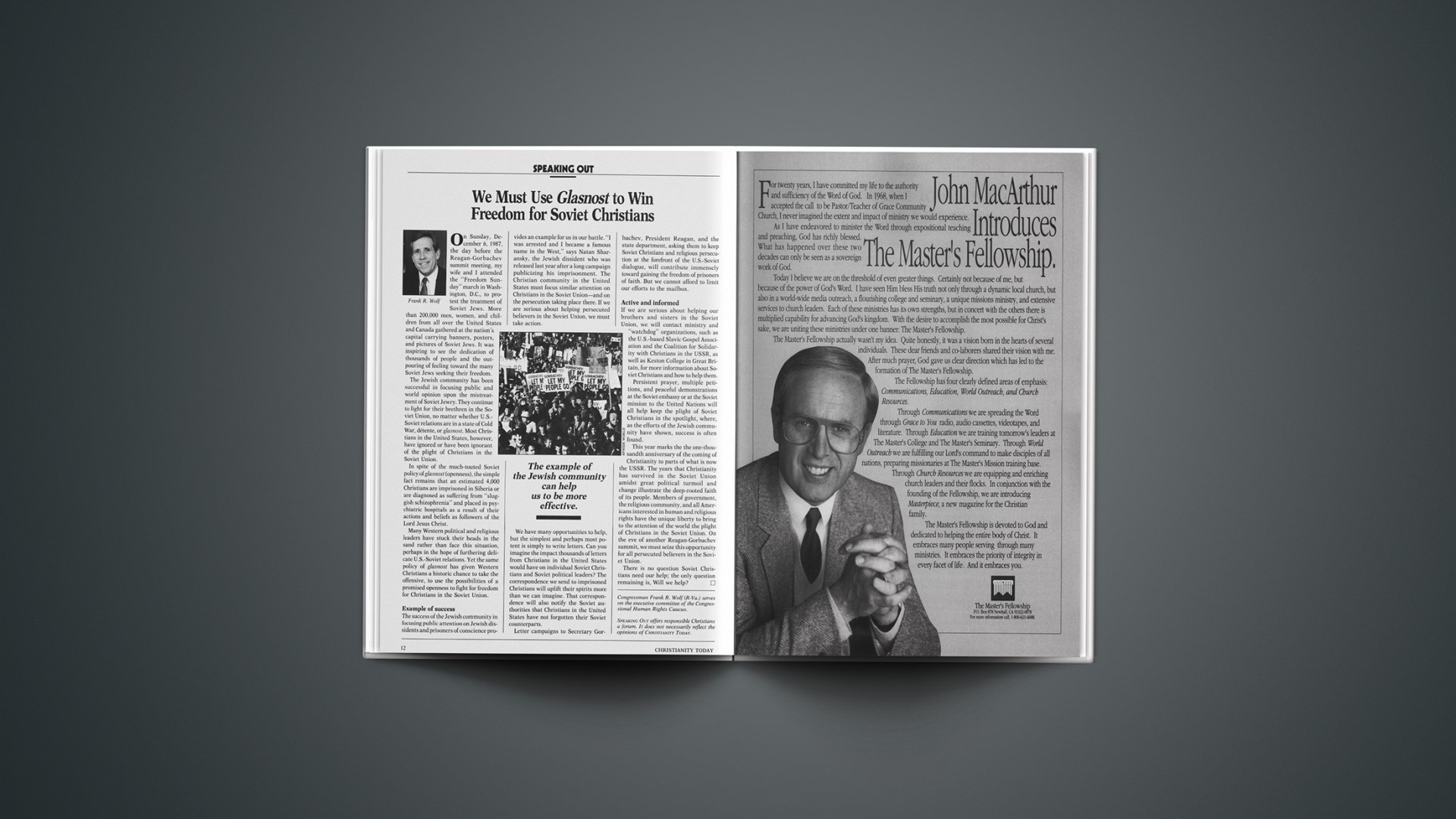On Sunday, December 6, 1987, the day before the Reagan-Gorbachev summit meeting, my wife and I attended the “Freedom Sunday” march in Washington, D.C., to protest the treatment of Soviet Jews. More than 200,000 men, women, and children from all over the United States and Canada gathered at the nation’s capital carrying banners, posters, and pictures of Soviet Jews. It was inspiring to see the dedication of thousands of people and the outpouring of feeling toward the many Soviet Jews seeking their freedom.
The Jewish community has been successful in focusing public and world opinion upon the mistreatment of Soviet Jewry. They continue to fight for their brethren in the Soviet Union, no matter whether U.S.-Soviet relations are in a state of Cold War, détente, or glasnost. Most Christians in the United States, however, have ignored or have been ignorant of the plight of Christians in the Soviet Union.
In spite of the much-touted Soviet policy of glasnost (openness), the simple fact remains that an estimated 4,000 Christians are imprisoned in Siberia or are diagnosed as suffering from “sluggish schizophrenia” and placed in psychiatric hospitals as a result of their actions and beliefs as followers of the Lord Jesus Christ.
Many Western political and religious leaders have stuck their heads in the sand rather than face this situation, perhaps in the hope of furthering delicate U.S.-Soviet relations. Yet the same policy of glasnost has given Western Christians a historic chance to take the offensive, to use the possibilities of a promised openness to fight for freedom for Christians in the Soviet Union.
Example Of Success
The success of the Jewish community in focusing public attention on Jewish dissidents and prisoners of conscience provides an example for us in our battle. “I was arrested and I became a famous name in the West,” says Natan Sharansky, the Jewish dissident who was released last year after a long campaign publicizing his imprisonment. The Christian community in the United States must focus similar attention on Christians in the Soviet Union—and on the persecution taking place there. If we are serious about helping persecuted believers in the Soviet Union, we must take action.
We have many opportunities to help, but the simplest and perhaps most potent is simply to write letters. Can you imagine the impact thousands of letters from Christians in the United States would have on individual Soviet Christians and Soviet political leaders? The correspondence we send to imprisoned Christians will uplift their spirits more than we can imagine. That correspondence will also notify the Soviet authorities that Christians in the United States have not forgotten their Soviet counterparts.
Letter campaigns to Secretary Gorbachev, President Reagan, and the state department, asking them to keep Soviet Christians and religious persecution at the forefront of the U.S.-Soviet dialogue, will contribute immensely toward gaining the freedom of prisoners of faith. But we cannot afford to limit our efforts to the mailbox.
Active And Informed
If we are serious about helping our brothers and sisters in the Soviet Union, we will contact ministry and “watchdog” organizations, such as the U.S.-based Slavic Gospel Association and the Coalition for Solidarity with Christians in the USSR, as well as Keston College in Great Britain, for more information about Soviet Christians and how to help them.
Persistent prayer, multiple petitions, and peaceful demonstrations at the Soviet embassy or at the Soviet mission to the United Nations will all help keep the plight of Soviet Christians in the spotlight, where, as the efforts of the Jewish community have shown, success is often found.
This year marks the the one-thousandth anniversary of the coming of Christianity to parts of what is now the USSR. The years that Christianity has survived in the Soviet Union amidst great political turmoil and change illustrate the deep-rooted faith of its people. Members of government, the religious community, and all Americans interested in human and religious rights have the unique liberty to bring to the attention of the world the plight of Christians in the Soviet Union. On the eve of another Reagan-Gorbachev summit, we must seize this opportunity for all persecuted believers in the Soviet Union.
There is no question Soviet Christians need our help; the only question remaining is, Will we help?
Congressman Frank R. Wolf (R-Va.) serves on the executive committee of the Congressional Human Rights Caucus.
Speaking Out offers responsible Christians a forum. It does not necessarily reflect the opinions of Christianity Today.










